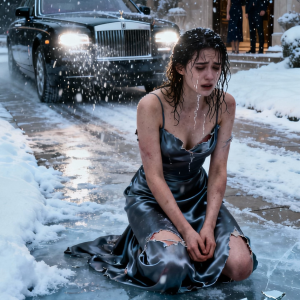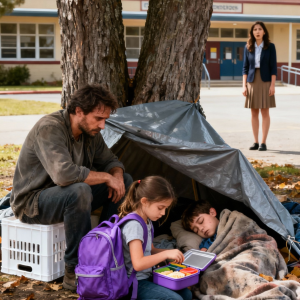
At ninety, I have little left to prove. The mirror shows a face lined with time, but behind those creases lives a man who has carried the weight of both success and solitude. My name is Edmund Kavanagh. For seventy years I built what many called the pride of Illinois—Kavanagh Grocers. It began as a single shop on a quiet street, where I stacked canned peaches with my own hands and greeted every customer by name.
When the empire grew, I told myself it was happiness. By the time I turned eighty, my signature appeared on every contract, every store lease, every smiling billboard. Yet, when the lights dimmed and the day ended, I returned to an empty house where the silence pressed harder than any responsibility. My wife, Helen, had passed long ago. We never had children. What good was a kingdom if no one waited at the gate?
One evening, I poured myself a glass of scotch and asked aloud, almost to the walls, “Who deserves everything I’ve built?” The question hung in the air, stubborn and unsparing. I knew the answer wasn’t the board members who bowed at meetings, nor the cousins who sent Christmas cards only when lawyers were involved. I wanted someone who understood decency for its own sake.
So I decided to test the world I had created. I took off my tailored suit, pulled on a threadbare jacket, and let the dust of neglect settle on me. The next morning, I entered one of my own supermarkets disguised as a drifter. The automatic doors opened with their usual cheer, but I felt the sting of eyes before I even reached the produce aisle. A young cashier whispered to her friend that I smelled like damp cardboard. They laughed behind their hands.
A manager, brisk and polished, approached. His name tag read Patrick Long. He once sent me letters begging for a promotion. “Sir,” he said stiffly, “I’m afraid you’ll have to leave. Our customers are uncomfortable.” I nodded, pretending not to care, though something inside me fractured a little.
As I turned to go, a voice stopped me. “Excuse me, sir. Are you hungry?”
He was a thin man in a faded shirt, his tie askew, his eyes gentle. The badge on his chest read Gabriel Morton. He guided me toward the break room as if it were the most natural thing in the world. Without hesitation, he poured coffee into a paper cup and set a sandwich before me.
“You remind me of my father,” he said quietly. “He worked himself to the bone, but he never let a stranger leave our porch hungry. He used to say kindness is a debt you should never stop paying.”

I thanked him, though my voice broke on the words. I wanted to tell him who I really was, but something told me this moment was pure only because he didn’t know.
That night, in the dim glow of my study, I changed my will. Every share, every building, every cent of my fortune would go to Gabriel Morton. It felt like breathing after a long time underwater.
A week later, I visited the store again, dressed in my finest navy suit. This time, the same people who once turned away hurried to greet me. Patrick bowed so low his glasses nearly fell off. “Mr. Kavanagh, what a surprise! If we’d known you were coming—” I raised a hand to stop him. Across the room, Gabriel looked up from stocking shelves. Our eyes met, and he gave a single nod—no smile, no question, just quiet understanding.
That evening, my phone rang. “Mr. Kavanagh,” he said softly, “I recognized your voice the moment you spoke to me that day. But I didn’t say anything because it shouldn’t matter who a person is. You were hungry. That was enough.”
Not long after, an anonymous letter arrived warning me not to trust him. I learned he had once stolen a car at nineteen and spent eighteen months in prison. When I asked him about it, he didn’t deny it. He said he had been young, foolish, desperate to be seen, and that prison had taught him what it felt like to lose all dignity. “That’s why I’ll never deny another person theirs,” he said.
My relatives were furious when they learned my plans. One of them shouted that I was throwing away the family name. I told her that blood had never guaranteed kindness, and that legacy meant nothing without compassion.
When I told Gabriel about the foundation I intended to create in his name, he shook his head. “I don’t want your money,” he said. “If you truly wish to honor what you built, feed those who have nothing, and give chances to those like me who lost their way once.”
And so, the Kavanagh Foundation for Human Dignity was born. We opened food banks, funded rehabilitation programs, offered scholarships to the forgotten. I made Gabriel its director for life.
Now, as I sit by the window of my nursing home, I think often of that day he handed me a sandwich. The memory is warmer than any award or profit I ever earned. Gabriel once told me that character is what remains when no one is watching. I believe him.
Because when the noise of achievement fades, and the years grow heavy, only kindness has the strength to outlive us.


